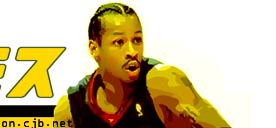





| So You Think You Know The Answer? |
|---|
|
FOR 76ERS STAR IVERSON, MATURITY
DOESN'T MEAN CONFORMITY |
|
While sparring with a group of reporters during the NBA playoffs, Philadelphia 76ers coach Larry Brown found the conversation turning to his mercurial superstar, Allen Iverson.
"It's getting better every day," the 58-year-old professor of old-school basketball said of his evolving relationship with the current icon of Generation-X hoops. "Did you see that great suit I got him to wear today?" "What about a tie?" someone asked. "Don't get carried away," Brown replied. "Let's take this one step at a time." The next day Iverson reverted to his customary attire: baggy jeans, designer shirt, dazzling jewelry, Philadelphia Phillies baseball cap. He may be maturing, but when all is said and done, Allen Iverson is going to be true to himself. The rising star known as "The Answer" has been called a lot of things during his brief NBA career, but "fake" has never been one of them. "I'm just trying to be me, man," said Iverson, who last season became the shortest player (he's listed at a generous six feet) to win an NBA scoring title (26.8 points per game). More importantly, he led the Sixers back to the playoffs for the first time since 1991. "I don't want to be anything phony."
Finding The Answer Too many people never tried to figure out why a player who was labeled the poster child for NBA bad boys was embraced by just about everyone under the age of 25, or why his No. 3 jersey is one of the top five sellers in the country. "A lot of adults have criticized Allen, but people his age, they love him," said Allen's uncle, Greg. "They see him as a real person who they identify with. I think the adults who don't like Allen, just don't know him." And that's Allen's biggest gripe. "All I want is for people to try to understand me," said Allen. "Just try to understand, you know, the way I am. It's better than just seeing something on TV, 'Oh, this guy's a terrible guy.' Or reading something in the paper. Sometimes that hurts and it bothers me because I know I'm not the person that people make me out to be." This year's playoffs represented an opportunity for Allen to communicate directly with a national audience. For the first time, the world got to see what Philadelphia already knew: It's not about how the man looks. It's about who the man is. Instead of the selfish basketball thug they may have expected, people saw an engaging, insightful 23-year-old basketball prodigy. "Everything's not going to be perfect all the time," Brown said, "but he's come so far in so many places. If I was his parent, I'd be as proud of him as anybody possibly could be of their son. As a coach, I feel the same way." Unlike two other young superstars, Kobe Bryant and Grant Hill, Allen was not raised in a suburban, upper-middle class environment. And he won't pretend that he was. "He's not going to be a white-collar, buttoned-down shirt, tie kind of guy," said 76ers president Pat Croce. "And I don't want him to be. I want him to be Allen Iverson. Some people are bald. Some people have cornrows. That's cool." Adds Henry "Q" Gaskins, Allen's friend (and his liaison with Reebok): "I think what Allen has been able to do is put a different image of what success can look like in people's minds. This year, with the Sixers becoming a winner, it's forced people to look at Allen differently."
Questioning the Answer He had been pardoned by the governor of Virginia and had played two trouble-free seasons at Georgetown. He had left college early because he felt the responsibility to earn the type of living that would allow him to move his family out of the Hampton projects. Allen hoped he could come to the NBA with a clean slate. Instead, he was the target of nearly constant criticism. In part this stemmed from his appearance. Allen was hip-hop. He dressed in funky clothes, wore flashy jewelry and listened to gangsta rap. His numerous tattoos included a bulldog, a helmeted-skull, and a cross surrounded by the words "Only the Strong Survive." While never abrasive or blatantly disrespectful, Iverson rarely hesitated to speak his mind. Some people found his candor alarming. Pretty soon Allen was being encouraged to change, and to cut ties with his longtime friends, some of whom were getting in trouble. The criticism he absorbed in those first two years still stings. "All I took was abuse and it wasn't fair," Allen said. "It seemed like people didn't want me to be successful." But Allen also recognized that his friends have a responsibility. "I had a sit-down with them and made them understand that even if you're not putting the basketball in a basket, if you get in some trouble and you're affiliated with me, it's gonna come down on me."
The Answer Takes Control Allen, who recently signed a six-year contract with the 76ers, did not renew the contract of his bodyguard because, as one friend said, "eventually, you grow up and stop getting into situations where you need a bodyguard." Allen attributes part of the change to his role as a father. He says that his 4-year-old daughter, Tiaura, and his 1-year-old son, Allen II, or "Deuce," have "matured me, made me want to make better and smarter decisions, so I can set a good example for them." And while making his mark in the NBA is still his primary concern, Allen, who is friends with rapper Mase and an acquaintance of music entrepreneurs Sean "Puff Daddy" Combs and Master-P, does have interest in one day creating his own record label. "I have guys who I grew up with that have a lot of talent," said Iverson, who is also an accomplished cartoonist. "Rather than let them go out there in the music world and get jerked around, I figure, 'Let's do this ourselves.'" On the court, Allen makes no secret that he wants to be the heir apparent to Michael Jordan. He wants to be known as the best basketball player in the world and win multiple NBA championships for the Philadelphia 76ers. And while he wouldn't mind having the marketing appeal of Jordan, he won't sacrifice his individuality or integrity to attain it. "If I want to see myself on TV, I can just turn on ESPN every night," Allen said. "I'm not big on having a bunch of commercials and all that. That's not what it's all about. If they're going to market me, I want it to be the way I am." Those who still question that attitude ... well, they just don't get "The Answer." |

|
|---|
| Author |
| John Smallwood |
| Source |
| Inside Stuff Mag |
| Return to Articles |